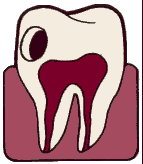
Tooth Decay Prevention
Although tooth decay is one of the most common dental diseases and a main responsible for the loss of teeth, it can be successfully controlled and prevented. Each one of us can take simple measures for tooth decay prevention in order to control the risk factors causing dental caries.
How to Prevent Tooth Decay?
Restoring tooth decay damage may present a significant additional cost to your health expenses. If you consider the toothache related with dental cavities, the treatment time and cost required and the compromised longevity of the affected teeth, it is always better to prevent tooth decay that treat it. In most cases, preventing dental cavities is relatively easy following a 2-way approach to:
- eliminate the causes of tooth decay by reducing the amount of dental plaque, bacteria and acids in the mouth, and
- strengthen the teeth's defenses
These tasks to help prevent dental caries can be accomplished by:
Control of dental plaque
The key factor in preventing tooth decay is the control of dental plaque bacteria in the mouth. By not allowing bacterial plaque to build up on the teeth’s surface, the production of acids that cause the de-mineralization of the enamel is inhibited. With dental plaque formation under control the risk of developing dental caries is significantly reduced.
Improved oral hygiene
The best way to control dental plaque is by improving your oral hygiene habits. Brush regularly at least twice a day (after each meal, if possible) and floss daily to remove plaque from between teeth and below the gumline.
Learning how to brush your teeth properly is also important for the successful removal of dental plaque. Using dental floss regularly is necessary for cleaning plaque from the areas in between teeth where the toothbrush can not reach easily.
Regular dental checkups and professional teeth cleaning
Brushing and flossing teeth cannot alone guarantee tooth decay prevention. Some plaque is always left behind, and even on cleaned tooth surfaces dental plaque rapidly begins to reform. Regular dental check-ups every 6 months that include professional tooth cleaning can help by eliminating sub-gingival build-up of dental calculus and plaque. The dentist will evaluate the efficiency of your oral hygiene routine and provide any necessary instructions to improve it.
Any signs of tooth decay can also be detected and treated before it causes serious damage to tooth structure. In the early stages of tooth decay the loss of minerals can be reversed before a restoration (dental filling or crown) is required.
Healthier diet and eating habits
Bacteria of dental plaque can not produce acids without sugar. A well-balanced diet with limited consumption of starchy or sugary foods can help in the prevention of tooth decay by not providing bacteria their main food source and reducing acid production.
The frequency and the amount of time the sugar stays in contact with the teeth is also important. Sipping a sugary soft drink over an hour is more damaging than eating a candy bar in 5 minutes, even though the candy bar may contain more sugar. Having a small sweet snack every 2 hours is more dangerous than having a single one after a meal even if the total amount of sugar was the same.
Brush your teeth (or at least rinse) after you have a sweet snack. Soft drinks are usually acidic and increase the risk of dental caries even if they do not contain sugar.
Fluoride
Fluoride is the best resource available for strengthening and protecting teeth from decay and healing early acid damage by replacing the lost minerals. Fluoride strengthens teeth by penetrating the tooth structure and replacing lost minerals to repair acid damaged surfaces which show early signs of calcium or phosphate loss.
Water fluoridation and brushing with a fluoride toothpaste are the most easy ways of delivering fluoride to the teeth surface to help in tooth decay prevention. If drinking water is not adequately fluoridated, fluoride supplements are recommended for children.
Fluoride or antibacterial mouthwashes
Fluoride mouthwashes can provide a supplementary dose of fluoride to strengthen teeth against dental caries. Prescription mouthwashes that contain antibacterial agents can help prevent decay by reducing the number of bacteria in the mouth. Chewing sugarless gums can also help preventing cavities.
Dental Sealants
In children, new molars can be protected from dental caries by dental sealants as soon as they emerge. Sealants can help adults too, to protect the biting surfaces of molars and premolars against tooth decay. Hard-to-clean pits and fissures (grooves), particularly on the back teeth, are more vulnerable to dental caries. Dental sealants provide a protective coating that isolates the tooth surface from the action of acids produced by plaque bacteria.
Proper daily oral hygiene, flossing and brushing teeth after a meal with a fluoride toothpaste, combined with a low sugars diet and visitng your dentist twice a year are usually enough for tooth decay prevention. Investing few minutes every day in removing dental plaque to prevent cavities is the best way to save time and money that you should need to treat tooth decay.

